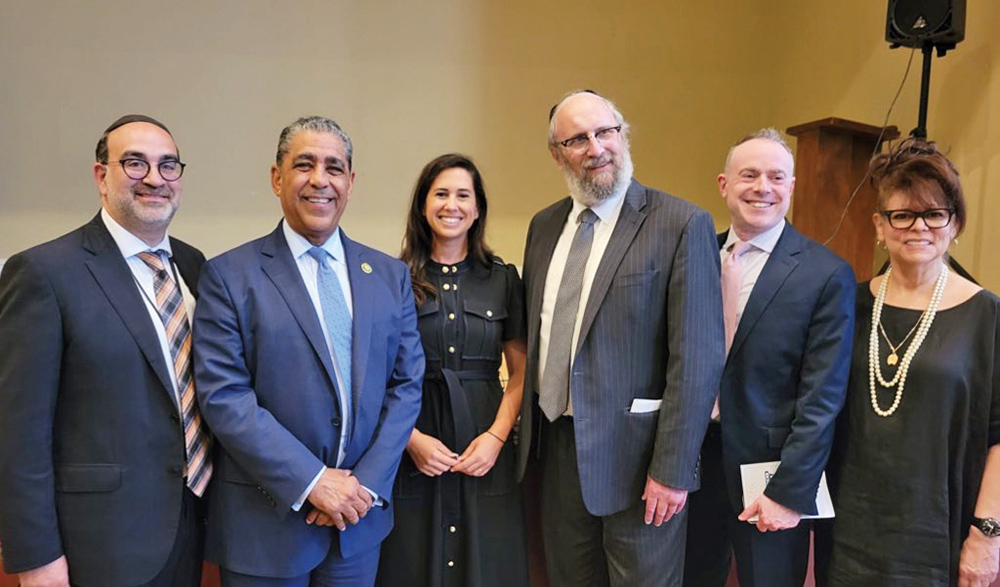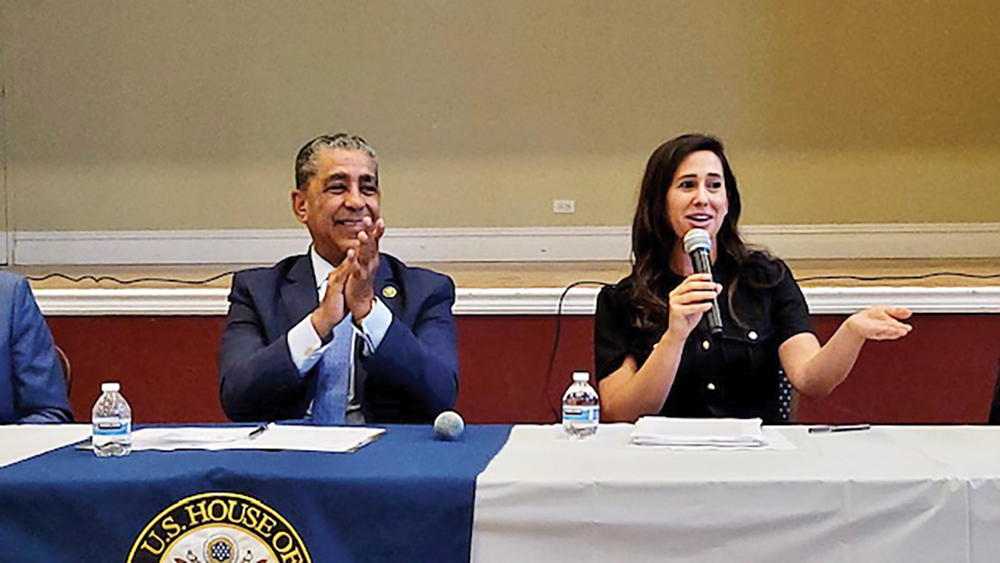
In the social hall of Mount Sinai Jewish Center in Washington Heights, community members, lay leaders and politicians gathered to hear from Shelley Greenspan, White House liaison to the American Jewish community, at a community town hall on June 29. The event, hosted by Rep. Adriano Espaillat (D-NY), featured remarks from multiple heads of Jewish organizations, a thorough outline of the White House Plan to Counter Antisemitism as presented by Greenspan and a lively Q&A with those in attendance. In just two short hours, the panel covered a wide range of issues and concerns for the Jewish residents of Washington Heights—and the United States.
“This is a special neighborhood,” Espaillat opened. “I’ve always said that one of the strongest communities here is the Jewish community. They’ve stayed here through both good times and bad times … and because of that, we’ve become stronger and have been able to build strong relationships within our community.” Indeed, the congressman referenced Yeshiva University, a mainstay of Washington Heights for well over a century, and the neighborhood’s historic synagogues, including the venue itself, Mount Sinai. “It’s important to raise our voices and push back against hate crimes. We have to continue to build bridges and make our bonds stronger,” said Espaillat, who also co-chairs the Latino-Jewish Caucus in the House.
Rabbi Yaakov Taubes of Mount Sinai Jewish Center introduced the town hall with a short benediction referencing the week’s parsha, Parshat Balak: “Balaam was hired to curse the Israelites, and God saved them by turning those curses into blessings,” he shared. “Now, we turn to God again to turn curses upon the Jewish people into blessings and continue to protect us.”
Right before the remarks from Jewish community leaders, Espaillat pointed out some notable people in the audience, including Jamie Emhoff, Second Gentleman Doug Emhoff’s sister, as well as Michael Miller, CEO emeritus of the Jewish Community Relations Council of New York (JCRC-NY). Noam Gilboord, COO of JCRC-NY, Josh Kramer, director of the American Jewish Committee (AJC) in New York, and Etzion Neuer, senior deputy regional director of the Anti-Defamation League (ADL) in New York all spoke about the issues the local Jewish community has faced in recent years. “New York experiences by far the most antisemitism in the country, and we always get questions about whether this is what 1930s Germany was like,” explained Neuer. “The difference is that we have a government that is pushing back against hate, and is working to reverse the normalization of antisemitism.”
In the main segment of the program, Greenspan spoke about the recently released 60-page plan to counter antisemitism. She stated that “this is exactly how my job is supposed to play out—I get to hear from community members about their concerns and relay it to the White House administration.” She continued that she takes “great pride” in the actions of the Biden administration, and that “our actions have reinforced the fact that the Jewish culture and values are essential to the character and vibrancy of America.”

Greenspan gave a concise outline of the White House strategy to combat antisemitism, a four-piece plan with a comprehensive list of 100-plus actions to be taken across every facet of American society. “We are implementing this plan continuously, and we expect the Jewish community and members of Congress to hold us accountable to that,” she explained. “We are not going to solve antisemitism, but we are doing our best. We believe these solutions are going to move the needle.”
In a surprise appearance, state Sen. Jackson (NY-31) spoke after Greenspan, reassuring the community that he is committed to implementing the White House plan. “I am in, all the way, and I’m not going anywhere,” he said. The town hall was then opened up for questions from the audience, as a dozen or so locals lined up to ask about pressing issues—and some, just to state them.
“Every city agency has diversity, equity and inclusion training,” said a city employee. “Why isn’t antisemitism included in workplace development?”
“How is this plan being implemented with ongoing political polarization?” asked a young community member. “What’s being done for the bipartisan divide in this country?”
The questions provided a springboard for the panelists to elaborate on pieces of the White House plan, notably the spearheading of a partnership with the Department of Education to create Holocaust-related curricula and antisemitism awareness for both K-12 classrooms and college campuses. “This is part of the opportunity that we all have,” said Greenspan. “These calls to action will take all of us in the room—it has to be a partnership.”
An example of building such partnerships is the Latino-Jewish Caucus, Espaillat said. “We are truly bipartisan in our scope … the hatred that is happening is deeply troubling, and we have to work really hard at this because it requires our ability to speak up.”
Rabbi Yeruchim Silber, director of New York Government Relations at Agudath Israel of America, posed a question about religious freedom in the state of New York, aptly referencing the Groff v. DeJoy Supreme Court case, announced earlier that day. With no direct answer to his question, Greenspan assured Rabbi Silber that work was being done actively with the Agudah on this issue, particularly regarding religious discrimination in land use and appropriation.
Perhaps in an unsurprising turn of events, two young members of the pro-Palestinian Jewish Voices for Peace movement also used the town hall as a platform. In response, Espaillat reaffirmed his pro-Israel views, explaining that he believes in the right for Jewish people to live in their homeland and to defend themselves. His strong statements were welcomed with warm applause from the community members in the audience, something that resonated with many of the lay leaders in attendance.
“I hope that the community sees that our elected officials care about us, even care about Israel, even though that was not the theme of the night,” Rabbi Taubes told The Jewish Link. “Congressman Espaillat came across as a strong supporter of Israel, and it’s important for Jews to hear that from our representatives in this day and age. It’s a very big deal.”
After hearing more suggestions from the audience, Espaillat stated that he needed to catch a flight immediately after the event, though he seemed eager to continue the conversation and encouraged the attendees to stop by his Washington Heights office on 181st Street.
As Greenspan wrapped up her thoughts, she shared that a big piece of the White House plan to counter antisemitism lies in educating Americans about the deep-rooted history of Jews in this country. “I think sometimes Jews get overlooked, but the best thing we can do is elevate our stories. Let’s celebrate our history.” “It was an honor to have Shelley Greenspan as my special guest at my event and to hear, firsthand, the plans that are being set in motion by the Biden administration to address antisemitism in our community,” Rep. Espaillat shared later with the Jewish Link. “New York City has unfortunately been the epicenter of the nation’s recent spike in antisemitic hate and hate crimes, to which Washington Heights has not been immune. Our vibrant Jewish community here deserves to feel safe.”
Channa Fischer is digital editor of The Jewish Link and is the resident 20-something in the office. She resides in Washington Heights.










